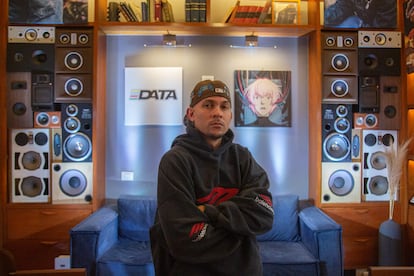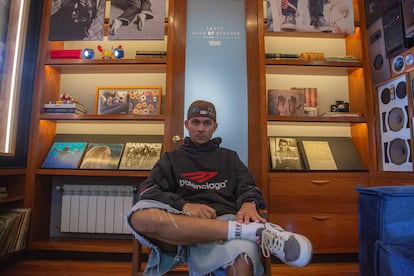Tainy, Bad Bunny and Daddy Yankee’s producer, on Mexican music: ‘People also said that reggaeton was “not music” and that “it’s a fad”’
The Puerto Rican artist is one of the most relevant people in music today. Here, he talks about his debut album, ‘Data,’ the future of Latin music and the success of regional Mexican music

A few vinyl records, several speakers and an anime drawing decorate the room where Puerto Rican music producer Tainy, 33, meets EL PAÍS. The space reflects his passion for music. “Many people know of me because of my work in the reggaeton genre and because of what I have been able to contribute to music in that genre. But I’m also a fan of music in general,” he says. Born Marcos Efraín Malís, Tainy was a key player in helping modern reggaetón come to dominate the international music scene; he has worked with renowned artists such as Bad Bunny, Daddy Yankee and Rosalía. He achieved all of this after starting his career when he was only 14 years old. A few days ago, alongside some of the genre’s greats, he released his debut album Data, with which he seeks to show the sounds that have supported him, as well as other styles that have expanded his musical horizons. From a small room in downtown Mexico City, Tainy talks to this newspaper about his successful album, the future of Latin music and the success of regional Mexican music.
He’s an approachable guy, and he speaks in a casual tone. “[On the album I can] not be singing, not be talking about the things I like and what I am, where I come from. But as a producer I can show something else, influences, what I like to do and, at the same time, influence and mix the music that people know me for, which is reggaeton,” he says. He started out with Luny Tunes, an important pair of producers in the urban genre who were influential during the 2000s and 2010s. They gave Tainy his start when he was just 14 years old. “They are the reason why I decided to make music, why I learned to find my sound…The label gave me my first opportunity in music as a professional, and… helped me do everything I did in my career. They didn’t have to do anything; they already had their status. Choosing this 14-year-old kid and letting him work with them is something for which I will always be grateful,” he says.

A member of his team talks to him, and gives him a baggy sweatshirt. Tainy’s clothing reflects the urban style of reggaeton artists: he wears a cap, an oversized T-shirt, shorts.... Under his cap, some pink-dyed hair can be seen; it is reminiscent of the Data cover. Released on June 29, his album is already a hit. It was the third-best debut album between June 30 and July 2 on Spotify, behind only American rapper Lil Uzi Vert’s Pink Tape and Mexican Natanael Cano’s Nata Montana. The album’s cover image shows the face of an anime character, a Japanese animation style that has also influenced Tainy’s career. “I got my taste for art, drawings and how they look from anime; I also [got my] imagination [from there]. [Anime] made me interested in things that maybe aren’t so literal and can only happen in real life. Expanding into that area has also helped me.”
He never raises his voice; he lets his tracks make noise for him in the broad genre of urban music. Data is a sonic trip of 19 songs in which Tainy has tried to put a twist on modern reggaeton; he is joined on the album by some of the genre’s stars. “It’s complicated [to bring them together on the same album], but it’s not a bad thing, quite the opposite. A lot of people I worked with and work with [now] are so global; they are touring the world, doing so many projects that it’s difficult to coordinate times, studio sessions, for me to send them music and for them to get a studio to record vocals...”. The album retains some classic reggaeton rhythms but also mixes them with electronic sounds. He has tried to take risks and moved the artists he worked with to a different scene, taking them out of their comfort zone. “It was kind of cool, and I liked their willingness. There are some that end up as two songs, some as only one, or their song sounds different from how people know them. I think that was also something I wanted to explore, to be able to put different spins on artists like Sech. As a producer, with my knowledge I was able to see what their voice is like, what their delivery is like when it comes to singing and to get to know other rhythms, other textures.”
In recent years, reggaeton has become a ubiquitous genre. It has reached urban scenes all over the world, and it has been a strong driver of Spanish-language music. “Growing up in Puerto Rico, and making this music, you thought you would get to a certain point and be happy with that. It’s incredible to be able to see everything that has happened from that point until today, and to see what musicians and artists have been able to represent for the Latin community,” he reflects. For decades, the genre was sidelined and stigmatized by class prejudice. But recently it has broken through. “Those [reggaeton] artists broke barriers, and the ones who are there now are not afraid to be who they are.”
The new artists are no longer afraid to be who they areMarcos Efraín Malís, a.k.a. Tainy
Historically, other genres on the scene—like rap and regional Mexican music, which has gained traction on the charts over the last few months—have also faced prejudice. “It makes me smile; that’s where reggaeton came from, too. [It faced] the same [criticism]: ‘that’s not music,’ ‘it’s a fad’, ‘it only happened here, but it won’t over there”... To me, everything in life makes sense. Everything happens when it has to happen. Many things have to come together so that they can go from one point to another, and if we are seeing it now, that’s because it has already had its moment.”
Tainy expresses his delight at the explosion of Mexican music today, which has begun to break the boundaries that once constrained it: “It’s incredible…it makes me happy that more Spanish music is being consumed and that people’s listening taste is growing. I’m dying to see where they continue to go and how they can mix different genres [and] cultures a little more.” The producer also leaves the door open to making his mark on Mexican music. “I’m open to anything that works in music, anything that inspires me, that works with good people, that seeks…to keep putting out music that people can enjoy. I’m 100% down for that,” he says.
The boy who got his start in the industry with Luny Tunes at 14 now speaks with them as an equal, as another heavyweight. “Having them over there…and thinking ‘wow! If they like it, I feel better. [Other] people will like it’ [...] Continuing to get their approval, making them feel proud of what they can achieve is a dream, one of the things I wanted to accomplish with this project. [There’s] nothing better than having a sense of family with the people who influenced me, the people I saw as gods when I was little.”
Sign up for our weekly newsletter to get more English-language news coverage from EL PAÍS USA Edition
Tu suscripción se está usando en otro dispositivo
¿Quieres añadir otro usuario a tu suscripción?
Si continúas leyendo en este dispositivo, no se podrá leer en el otro.
FlechaTu suscripción se está usando en otro dispositivo y solo puedes acceder a EL PAÍS desde un dispositivo a la vez.
Si quieres compartir tu cuenta, cambia tu suscripción a la modalidad Premium, así podrás añadir otro usuario. Cada uno accederá con su propia cuenta de email, lo que os permitirá personalizar vuestra experiencia en EL PAÍS.
¿Tienes una suscripción de empresa? Accede aquí para contratar más cuentas.
En el caso de no saber quién está usando tu cuenta, te recomendamos cambiar tu contraseña aquí.
Si decides continuar compartiendo tu cuenta, este mensaje se mostrará en tu dispositivo y en el de la otra persona que está usando tu cuenta de forma indefinida, afectando a tu experiencia de lectura. Puedes consultar aquí los términos y condiciones de la suscripción digital.









































